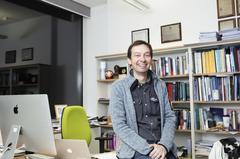URL: https://www.desy.de/news/news_search/index_eng.html
Breadcrumb Navigation
DESY News: Henry Chapman becomes a Fellow of the Royal Society
News
News from the DESY research centre
Henry Chapman becomes a Fellow of the Royal Society
The Royal Society has elected DESY researcher Henry Chapman as a Fellow. The leading DESY scientist is a pioneer of lensless imaging using X-ray lasers and has provided previously unattainable insights into the inner structure of matter with the numerous methods he has developed or proposed. “I am deeply honoured,” said Chapman, who is also a physics professor at the University of Hamburg and one of the spokespersons of the Cluster of Excellence CUI: Advanced Imaging of Matter. “This is also a great acknowledgement of the promise and excitement of the field of X-ray science with free-electron lasers and it really speaks to the excellent environment for science that we have built up at DESY and the University of Hamburg.”

Henry Chapman is a Lead Scientist at the Center for Free-Electron Laser Science CFEL at DESY. Credit: DESY, Gesine Born
Katharina Fegebank, Hamburg's Second Mayor and Senator for Science, Research and Equality congratulated: “My warmest congratulations to Henry Chapman! It is a great honour for our city to have such an internationally outstanding researcher at the science location Hamburg. The Corona crisis in particular shows that it is science that can find the answers to the greatest challenges facing us. Henry Chapman's research group is currently also involved in searching for possible drugs for the treatment of patients with SARS-CoV-2 infection.”
DESY Director Helmut Dosch emphasised: “I congratulate Henry Chapman on this honourable award by the Royal Society that recognises his outstanding and pioneering contributions to modern X-ray crystallography. DESY is very proud to have an internationally renowned scientist of this calibre on board.”
The Royal Society of London for Improving Natural Knowledge is the British Academy of Sciences and the oldest national scientific society in the world. Its members included Isaac Newton, Charles Darwin, and Stephen Hawking. Currently, the Royal Society has about 1600 members, who are called Fellows. Members are elected and must be proposed by two Fellows each. Each year up to 52 new Fellows can be elected from the usual 700 or so proposals. The requirements are groundbreaking scientific achievements and citizenship of the Commonwealth. Up to ten Foreign Members may be elected from other countries each year. Among the new members this year is also the Nobel laureate Ada Yonath of the Weizmann Institute in Israel, who carried out much of her groundbreaking research using DESY X-ray facilities.
“At this time of global crisis, the importance of scientific thinking, and the medicines, technologies and insights it delivers, has never been clearer,” said Venki Ramakrishnan, President of the Royal Society. “Our Fellows and Foreign Members are central to the mission of the Royal Society, to use science for the benefit of humanity.”
Born in Great Britain, Chapman received his doctorate in Australia and then worked as a researcher in the USA before joining DESY in Hamburg in 2007 as founding director of the Center for Free-Electron Laser Science CFEL. Free-electron lasers such as the European XFEL are new and unique research tools. They generate the brightest and shortest X-ray laser flashes in the world and enable previously unimaginable insights into biological systems and fast biomolecular processes.
Chapman is regarded as the pioneer of Serial Femtosecond X-ray Crystallography, which, among other things, makes it possible to explore the spatial structure of sensitive biological molecules with atomic precision even under near-functional conditions. The first experimental proof that this technique works was provided by Chapman and his colleagues at DESY's free-electron laser FLASH. Chapman has received many honours for his groundbreaking research, including the Leibniz Prize, an honorary doctorate from the University of Uppsala, and the Röntgen medal from the city of Remscheid, the birthplace of Wilhelm Conrad Röntgen.



